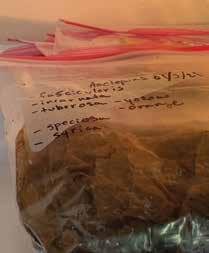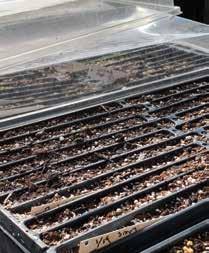
3 minute read
Stratify Native Plant Seeds
Cold Stratification of Native Plant Seeds
Starting native plants from seed is an inexpensive way to grow a bountiful garden on a budget. This method also generates more food for local birds and pollinating insects like bees and butterflies.
The only hiccup in the plan is that most native Midwest perennial seeds need what is called cold stratification. This extra step often turns gardeners away and in the past I was quite happy to buy all of my native plants from local nurseries. Last year, I gave cold stratifying a try and found out that it’s really not as difficult as it sounds.
Firstly, let’s talk about what cold Stratification means. We are really just trying to recreate the natural processes that a seed would go through in their native habitat in order to get them to break dormancy and germinate. For this article we will use our common milkweed (Asclepias syriaca) as an example. So in nature this plant’s seed needs a few weeks in a cold (not freezing) environment and they prefer their seeds to stay moderately moist.
Why would we cold stratify when we have nature right outside the door? You can certainly disperse seeds straight out into the garden in fall and early winter. Monarch Watch has found that germination rates are higher if you start your seeds indoors. If you have purchased seeds, then cold stratifying will give you more bang for your buck.
There are a few ways to cold stratify at home. Last year, I sowed my seeds into tiny seed trays full of damp potting soil in a sealable bag. My germination rates weren’t that fabulous, so this year I am trying the paper towel method.
I collected seeds from friends and my own garden and I am wrapping them in paper towels that have been wet and rung out well. Then, I simply place them into a sealable container, date and label everything, then place in the refrigerator.
When picking a date to start the cold stratifying process, count back how many days this seed needs to stratify, plus how many days it will take to germinate in the soil and finally, how many days you think it will grow indoors before finally planting outside.
For example, I want to plant common milkweed plants outside on the fourth Saturday of May this year (5/22). The seed needs 30-60 days in the fridge, then about 7-10 days to germinate in soil, and probably another 2-3 weeks to grow strong enough roots for a transplant.
So, I will start moist cold stratification of common milkweed seeds in the fridge in mid-March, then in mid-April I will take them out and plant them into pots or flats in the garage and gently water until they germinate at the end of April. This gives them most of May to grow some fabulous roots. If everything goes to plan, I’ll have some really nice milkweed to plant by the end of May.
With native plants don’t worry about exact dates, and give yourself some wiggle room on your schedule. I usually move my plant dates a few days later than necessary, to a weekend for example, so I’m not juggling potting soil while trying to make Thursday night dinner. You can always speed things up later on with a heated seed mat and a grow light.
Gardening is a great way to try different things and experiment with all types of growing methods. I have friends starting their native perennial seeds in outdoor controlled environments like raised planter beds and repurposed milk jugs. Every garden and every gardener is different, so give growing native seeds a try!



Discover More
In addition to the valuable information found at local native plant nurseries, discover more about stratifying native perennials with these organizations:
Missouri Department of Conservation mdc.mo.gov
The Xerces Society xerces.org
Monarch Watch www.monarchwatch.org
Missouri Botanical Garden www.missouri botanicalgarden.org
Grow Native! grownative.org
TRACY FLOWERS Plant Guru
Tracy Flowers is the owner of Tracy Flowers LLC, a horticultural consultancy that works with local organizations to promote organic urban farming, gardening, native landscapes and education. Her email addresss is kctracyflowers@gmail.com.








